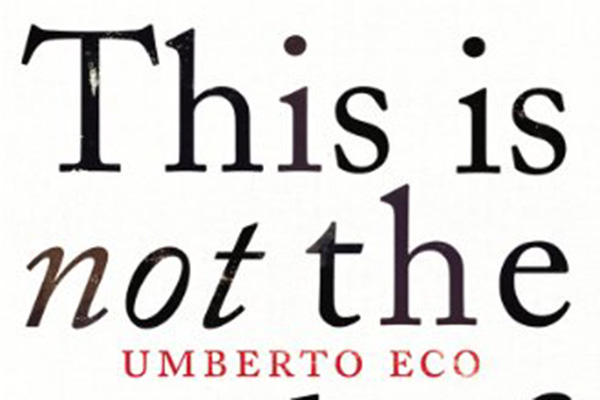This is not the end of the book
By Umberto Eco and Jean-Claude Carriére
This is Not the End of the Book is itself derived from a series of conversations between Eco and Carrière that have been lightly edited and arranged into chapters by Jean-Philippe de Tonnac. Even though the book is organised into chapters on, say, the impact of technology on reading, or the books we’ve lost to the ravages of time and censorship, we never lose sight of the fact that this book arose out of conversations, and so the book has this meandering, relaxed feel which is really enjoyable to read. You can imagine Eco and Carrière sitting round in Eco’s living room having a chat over some Tuscan wine.
Because of this chilled out, comfortable vibe, we get a chance to “get to know” Eco and Carrière, and they both seem like erudite, intellectually curious people, with an encyclopaedia of knowledge in their heads and a perhaps surprisingly eccentric taste in books. Case in point: my favourite chapter was called “In praise of stupidity,” where Eco and Carrière discuss the books that do nothing but show how stupid their authors are. Quite rightly, they point out that these published proofs of human stupidity actually show a lot about the cultural and intellectual context of that time. But less seriously, it’s clear that for Eco and Carrière all those stupid authors are just fodder for amusement. As Carrière says, they are “faithful lovers [of stupidity…] Human stupidity can count on us.”
My main complaint is, paradoxically, bound up with why I like the book. The conversational tone makes it quite an easy read, but at the same time, the book’s meandering quality means that you put the book down not really feeling like you’ve learned anything or drawn any conclusions on the topic of the book. Without a strong narrative architecture to focus your attention, the book feels a little vague, and about as tightly structured as porridge. But that’s the nature of the conversation, I suppose—it goes everywhere. So don’t pick up this book expecting heavy duty theorising or analysis. This is a beach read for the book nerd, and a pretty enjoyable one at that.







